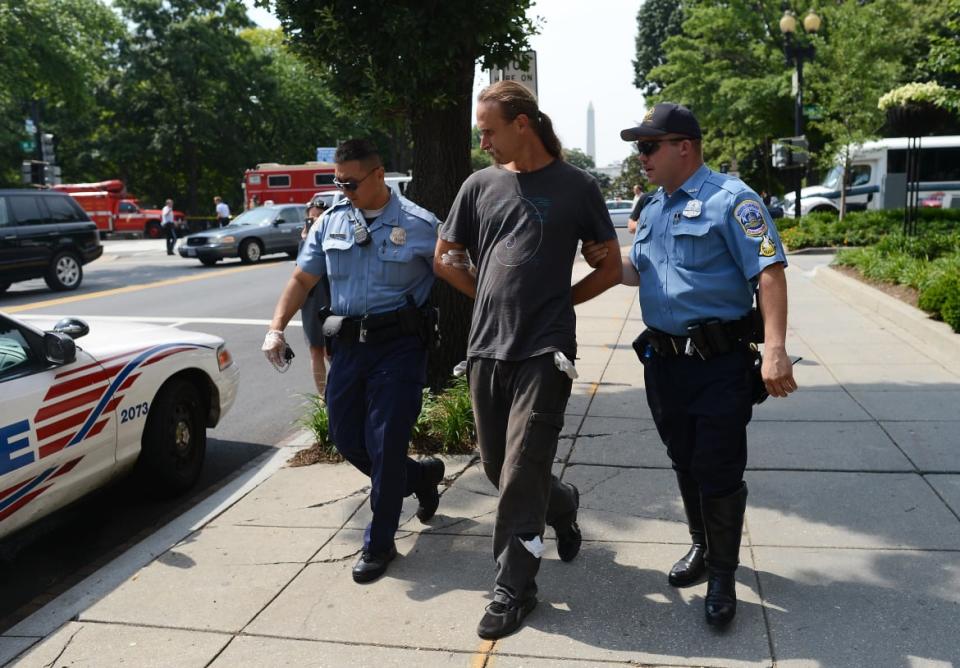How COVID-19 Is Helping Bankroll Magic Mushroom Legalization

Election Day saw a string of huge wins for drug policy reform across the country, but nowhere went further than Oregon. Along with decriminalizing possession of small amounts of drugs—all drugs, across the board—voters there became the first to legalize adult access to psilocybin mushrooms.
In a very direct way, the COVID-19 pandemic helped make all this happen.
Polling repeatedly shows the drug war is vastly unpopular. And drug reform is a rare example of a true bipartisan issue. But so far in the U.S., most actual policy change on drugs has come at the ballot box.
Winning over voters requires huge sums of money. And David Bronner, the ponytailed, vegan chief executive of his family business, Dr. Bronner’s Magic Soaps, says he was able to write checks totaling more than $6.4 million towards drug-war reform campaigns in three states and Washington, D.C., this year because the pandemic has been very good for the soap business.
Last year, the company reported a record $129 million in revenue. In 2020, sales are on track to increase by 50 percent, Bronner told The Daily Beast during a recent phone interview. That opened the spigot wide for major strides on access to shrooms and weed, while working to end arrests for heroin and meth, too.
Specifically, according to Bronner, the cash influx meant much bigger than anticipated checks for medical psilocybin legalization ($3.4 million) and drug-decriminalization ($1 million) campaigns in Oregon. Also part of his spending spree: a mushroom decriminalization measure in D.C. ($650,000), and cannabis legalization efforts in Montana and South Dakota ($1.4 million total).
“Obviously, it sucks overall, but in this regard, it was good timing,” Bronner told The Daily Beast of the pandemic-legalization link. “We would at most be spending half that, ordinarily.”
‘It Was Like an Exorcism’: Inside Oregon’s Magic Mushroom Underground
In all, Dr. Bronner’s made $6.685 million in political donations this year, all funneled through New Approach PAC, a D.C.-based 527 nonprofit that’s been bankrolling drug reform efforts for years, according to IRS filings. (Bronner gives so much money that he briefly lost count; in an earlier conversation, he said he’d only given $5 million, underestimating his own efforts by more than 20 percent. “I guess it was that much!” Bronner said Friday. “Hard to keep track.”)
It remains to be seen whether the COVID windfall will be a “new normal” for the company, but flush with victory as well as some cash, Bronner is now in a unique position. If he wants to, he can pick which states are next to push drug policy reform past merely creating a commercial marijuana industry.
Though Bronner arguably deserves props for donating via a more transparent 527 nonprofit—rather than an opaque 501(c)(3) or 501(c)(4), “political nonprofits” that the Center for Responsive Politics calls vehicles for “dark money”—his approach is no solution to America’s campaign-finance morass, where venture capitalists pay to make the laws legislators won’t. And there are fair questions to be asked when any business titan throws around so much cash, even on issues with broad support from public health experts.
Still, the guy is getting results, however piecemeal.
It will be some time before Oregonians can legally use mushrooms, of course. Measure 109, the successful ballot initiative on that front, requires the Oregon Health Authority to regulate growers as well as therapists, who would provide psilocybin during licensed therapy sessions, but not before a two-year planning process is over.
By that time, more states may be joining the party.
Next up for psilocybin legalization, Bronner says, is Washington state in 2022. Then, in 2024, maybe California and Colorado, cash willing.
“We’re at an inflection point in the culture… but really, it’s a function of the firepower available,” Bronner said.
With that caveat, if it is Washington, Oregon might just have been an amuse-bouche. “I think.” he added, “we can push it even further.”
As an activist political bankroller, Bronner is something like a Charles Koch or a Robert Mercer, but for drug policy reform. And in this pantheon, he sticks out. Drug legalization has always relied on the generosity of a select few, but until now, they have largely been besuited tycoons: financier and far-right target George Soros, “Prince of the Pit” Richard Dennis, the late Progressive Auto Insurance founder Peter Lewis, and the late University of Phoenix founder John Sperling.
Bronner doesn’t look like them. Nor does he act like them: In 2012, he was arrested for protesting Barack Obama, locking himself in a cage with some illegal hemp plants in front of the White House.
Drug Policy Alliance, which draws much of its funding from Soros’s Open Society Foundation, is still arguably the major player in the drug-reform and legalization space. But Bronner was the chief backer of Measure 109, the mushroom initiative, which raised north of $3 million total, $2.75 million from Bronner-backed New Approach PAC, as the most recent campaign finance filings show. (The rest of the $3.4 million he contributed to that effort came in after the most recent disclosure deadlines, according to Graham Boyd, New Approach’s political director.)
Did Early Christians Use Psychedelics?
While Bronner’s $1 million check to Measure 110, the across-the-board drug decriminalization effort, shamed Facebook’s Mark Zuckerberg—whose Chan-Zuckerberg Initiative gave “only” $500,000—DPA’s political arm, Drug Policy Action, was the main bankroller there, records show.
In the future, Bronner wants closer coordination with legalization’s other funders. “If we all line up as one grand coalition, we can run twice as many ballot measures in any given cycle,” he said. “We’re working hard on figuring that out.”
But for now, this is where we are: Soros, Zuck, and the weirdo hippie soap-maker from San Diego. This is who’s paying to end the drug war. And it’s working.
“It’s safe to say DC Initiative 81 wouldn’t have gotten far without him,” said Sanho Tree, director of the Drug Policy Project at the Institute for Policy Studies, a left-leaning Washington, D.C.-based think tank. “His money has been a big asset in moving the ball down the field, and I’m sure it will be a big help in Washington state.”

Police detain David Bronner after cutting open a cage he was protesting from inside on a street near the White House in Washington, DC, on June 11, 2012.
In Oregon, Portland-based therapists Sheri and Tom Eckert had been pursuing mushroom legalization since last year. In normal times, they might have been able to win with a bootstrapped, purely grassroots effort. But grabbing signatures and running a door-to-door campaign, without media buys, would have been way harder under the pandemic. When Bronner arrived, he brought expertise and advice—as well as dollars.
“Beyond the big donations, David was fully involved as part of our strategic advisory committee,” Tom Eckert said. “He's both a team player and a difference maker, which is what we needed. I'm sure our success in Oregon will be seen as a template for the rest of the country, as we feel it should be.”
Right now, Bronner’s plan is to do in Washington what was done in Oregon, but in one fell swoop: packaging the drug-decriminalization seen in Measure 110 together with Measure 109’s legalized psilocybin therapy, in one ballot initiative. (Whether that will be too much all at once for voters to swallow remains to be seen.)
With marijuana legalization, the technique has been to move slowly, with medical cannabis preceding commercial recreational pot. That was the move with mushrooms in Oregon. But that all could change: This cycle, South Dakota became the first state to bypass medical marijuana legalization as an incremental step and go straight for adult use.
Bronner’s goal is to eventually allow adults in America to legally use mushrooms at concerts and at home as well as in therapy settings. That might happen sooner rather than later, if Americans keep buying his soap.
“It’s moving faster than I would have thought,” Bronner said. “I would not have thought we’d be ready for the kind of reforms we’re seeing, and it’s gratifying. I just think we can go further in 2022 and 2024.”
Get our top stories in your inbox every day. Sign up now!
Daily Beast Membership: Beast Inside goes deeper on the stories that matter to you. Learn more.

